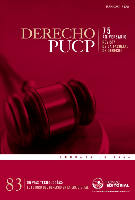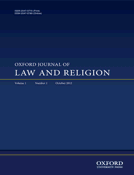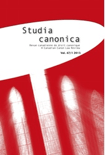
Revista General de Derecho Canonico y Derecho Eclesiastico del Estado
Scope & Guideline
Advancing Scholarship at the Intersection of Religion and Law
Introduction
Aims and Scopes
- Ecclesiastical Law and State Relations:
Explores the legal frameworks that govern the relationship between religious institutions and the state, including issues of autonomy, recognition, and cooperation. - Human Rights and Religious Freedom:
Analyzes how religious practices intersect with human rights, focusing on freedom of religion and belief, conscientious objection, and discrimination. - Legal Implications of Digital Society:
Investigates the challenges and opportunities presented by digital technology in the context of religious law and practice, particularly regarding privacy and data protection. - Cultural Heritage and Religious Practices:
Examines the legal status and protection of religious buildings and practices as cultural heritage, assessing the balance between preservation and modernization. - Ethics and Law in Public Policy:
Addresses ethical considerations in law, particularly concerning controversial issues like euthanasia, abortion, and religious influence in legislation. - Indigenous Rights and Religious Freedom:
Focuses on the legal protections and implications for the religious practices of indigenous peoples, emphasizing the intersection of cultural identity and religious freedom.
Trending and Emerging
- Impact of Technology on Religion:
A growing number of articles are addressing the implications of technology on religious practices and legal frameworks, highlighting the relevance of digital rights in the context of religious freedom. - Euthanasia and Conscientious Objection:
The journal has increasingly published works focused on euthanasia laws and the rights of individuals to object on religious grounds, reflecting ongoing debates in many countries regarding end-of-life issues. - Intersections of Gender and Religious Freedom:
There is a notable rise in discussions surrounding gender equality within religious contexts, particularly how religious laws interact with issues of gender rights and discrimination. - Religious Diversity and Public Policy:
Emerging themes involve the legal recognition and accommodation of diverse religious practices in public policy, particularly in multicultural societies. - Human Rights in the Context of Migration:
The journal is increasingly addressing the challenges faced by migrants regarding religious freedom and human rights, reflecting a growing recognition of the intersectionality of these issues.
Declining or Waning
- Historical Analysis of Canon Law:
While historical perspectives on canon law were once prevalent, recent publications suggest a shift towards more contemporary issues, indicating a decreased emphasis on historical legal frameworks. - Traditional Religious Practices:
There appears to be a decreasing focus on traditional religious practices in favor of discussions surrounding modern ethical dilemmas and human rights, indicating a shift towards more current societal issues. - Comparative Studies of Religious Laws:
The journal has seen a decline in comparative analyses between different religious legal systems, suggesting a potential narrowing of focus towards specific national contexts rather than broader comparative frameworks.
Similar Journals

Anuario de Filosofia del Derecho
Cultivating Knowledge in Legal PhilosophyAnuario de Filosofia del Derecho is a prestigious journal dedicated to the exploration and advancement of legal philosophy, published by the Ministerio Justicia, Centro Publicaciones in Madrid, Spain. With its ISSN 0518-0872, this journal serves as a critical platform for scholars, practitioners, and students interested in the intricate relationship between law and philosophy. The journal prioritizes original research articles, review papers, and thought-provoking essays that delve into contemporary issues and foundational theories within legal frameworks. Although currently not an open-access publication, it plays a vital role in stimulating discourse in legal and philosophical studies, guiding readers through complex theoretical landscapes while fostering a deeper understanding of justice and legal systems. By contributing to the discourse on legal thought, Anuario de Filosofia del Derecho stands out as an essential resource for anyone seeking to advance their knowledge in this field.

Derecho PUCP
Empowering legal discourse through open access.Derecho PUCP is a distinguished open access journal published by the Pontificia Universidad Católica del Perú, specifically from the Faculty of Law. With a commitment to advancing legal scholarship, this journal has been an essential resource in the field of law since 2005, providing researchers, practitioners, and students with access to critical analyses and discussions on various legal topics. Based in Lima, Peru, Derecho PUCP holds a prestigious position with a Q2 ranking in the Law category, reflecting its impactful contributions to the social sciences, particularly in the legal domain. The journal publishes cutting-edge research and promotes innovative discourse, aiming to foster academic excellence and engage with contemporary legal challenges. As it continues to converge into its future issues from 2019 to 2024, Derecho PUCP exemplifies a vital platform for those committed to the pursuit of legal knowledge and research.

Revista de Derecho Politico
Advancing Legal Discourse and Political InsightRevista de Derecho Politico, with ISSN 0211-979X and E-ISSN 2174-5625, is a distinguished academic journal published by the Servicio Publicacion y Difusion Digital Biblioteca UNED. Established in 1978 and operating under an Open Access model, the journal has garnered a reputable position within the field of law and political science, emphasizing its commitment to accessibility and dissemination of research. Based in Madrid, Spain, it has witnessed a notable evolution in its category quartiles, achieving Q2 rankings in both Law and Political Science and International Relations as of 2023. Its contributions to the academic community are further reflected in its Scopus ranks, placing it within the 42nd percentile in Law and the 33rd percentile in Sociology and Political Science. The journal serves as a pivotal platform for scholars, practitioners, and students alike, fostering dialogue and advancing knowledge across multiple disciplines, including sociology and political sciences. With a convergence period spanning from 2014 to 2024, it continues to address contemporary legal and political issues, making it an essential resource for those invested in these dynamic fields.

Revista Chilena de Derecho
Pioneering Ideas in Legal DiscourseRevista Chilena de Derecho, published by the esteemed Pontificia Universidad Católica de Chile, stands as a leading academic journal in the field of law, holding a prestigious Q1 ranking in the 2023 category classification. With its ISSN 0718-3437, the journal has been pivotal in advancing legal scholarship from its establishment in 2007 to the present. Located in Santiago, Chile, the journal serves a diverse audience of researchers, legal practitioners, and students dedicated to understanding the complexities of legal frameworks both in Chile and globally. Although the journal currently does not offer open access, its rigorous peer-review process ensures that each publication contributes significantly to legal discourse and research. With a commitment to fostering innovative ideas within the legal community, Revista Chilena de Derecho is not only a repository of knowledge but also a catalyst for scholarly debate and professional growth.

Journal of East Asia and International Law
Fostering Dialogue on International Law in a Dynamic RegionThe Journal of East Asia and International Law, published by the YIJUN Institute of International Law, serves as a vital platform for scholarly discourse in the field of law, with a particular focus on the complexities of East Asian legal systems and their interactions within the global context. Established in 2011 and based in Seoul, South Korea, this journal has been pivotal in fostering research that examines legal issues impacting East Asia, making significant contributions to the understanding of international law in this dynamic region. With its ISSN 1976-9229, the journal provides a valuable resource for researchers, professionals, and students interested in the evolving legal landscapes of East Asia. Though currently categorized in the Q4 quartile for law in the Scopus rankings, its dedication to enhancing legal scholarship positions it as a relevant player among emerging international law journals, encouraging submissions that explore innovative legal approaches and analyses. As ongoing interdisciplinary discussions deepen, the Journal of East Asia and International Law aims to enrich the academic community's understanding of international legal frameworks within East Asian contexts.

Oxford Journal of Law and Religion
Advancing Scholarly Dialogue at the Crossroads of Law and ReligionThe Oxford Journal of Law and Religion, published by Oxford University Press, serves as a critical platform for the interdisciplinary exploration of legal and religious dimensions within contemporary societal frameworks. With an ISSN of 2047-0770 and an E-ISSN of 2047-0789, this journal has rapidly gained recognition in the fields of Law (Q4) and Religious Studies (Q3), as evidenced by its notable Scopus rankings – holding the 85th percentile in Religious Studies. Operating out of Oxford, UK, the journal focuses on fostering scholarly dialogue and advancing research that addresses the intricate relationships between legal systems and religious beliefs, appealing to scholars, legal practitioners, and theologians alike. Although it does not offer open access, the journal remains integral in shaping academic discourse from 2012 to 2023, ensuring that crucial intersections of law and religion are thoroughly examined and accessible to the academic community.

Revista Boliviana de Derecho
Exploring Legal Frontiers in Bolivia and BeyondRevista Boliviana de Derecho is a prominent academic journal dedicated to the exploration and dissemination of legal studies, particularly focusing on the issues pertinent to Bolivia and Latin America. Published by Inst Derecho Iberoamericano, this journal serves as a vital platform for researchers, legal professionals, and students to engage with contemporary legal theories and practices. With its ISSN 2070-8157 and E-ISSN 2706-8080, the journal adheres to high academic standards and aims to contribute significantly to the advancement of legal scholarship in the Spanish-speaking world. Although it operates within a closed access framework, its publications are crucial for understanding the evolution of legal frameworks and their implications in a rapidly changing society. By providing a convergence of diverse legal opinions and analyses, Revista Boliviana de Derecho remains an essential resource for anyone invested in the field of law.

COMMON MARKET LAW REVIEW
Exploring the Dynamics of European LawCOMMON MARKET LAW REVIEW is a premier scholarly journal published by KLUWER LAW INTERNATIONAL, dedicated to the rigorous analysis of legal and policy issues related to the European Union and broader international frameworks. With an ISSN of 0165-0750 and E-ISSN 1875-8320, this esteemed publication holds a distinguished position in the field, recognized in the Q1 category for both Law and Political Science and International Relations as per the 2023 rankings. Its impressive Scopus rankings—#131 out of 1,025 in Law and #151 out of 706 in Political Science—underscore the journal's significance, placing it within the top percentiles of its categories. Operating without open access, the journal presents articles that contribute to scholarly discourse from 1996 through 2024, making it an invaluable resource for researchers, legal practitioners, and students keen on advancing their understanding of European law and regulatory regimes. The COMMON MARKET LAW REVIEW is essential reading for those engaged in rigorous research and the evolution of legal thought in a rapidly changing global context.

UNIVERSITY OF NEW SOUTH WALES LAW JOURNAL
Championing Innovative Legal Research Since 1983University of New South Wales Law Journal, published by the University of New South Wales, Faculty of Law, is a leading academic journal that serves as an essential platform for discourse in the field of legal studies. With an ISSN of 0313-0096 and an E-ISSN of 1839-2881, the journal has been a beacon of legal scholarship since its inception in 1983. Operating from Kensington, New South Wales, Australia, it provides profound insights into various legal issues, emphasizing interdisciplinary perspectives by also being recognized in the fields of philosophy, sociology, and political science. While it maintains a Q3 ranking in Law and has shown increased visibility in Philosophy at Q2 according to the 2023 category quartiles, the journal assures a diverse range of critical analyses from scholars, professionals, and students alike. It is particularly valuable for researchers seeking to engage with contemporary legal debates, ensuring they remain at the forefront of academic and practical discussions in law and related disciplines.

Studia Canonica
Cultivating a Global Discourse on Canonical MattersStudia Canonica is an esteemed academic journal published by PEETERS, dedicated to the field of religious studies with a particular focus on canonical law and ecclesiastical matters. Since its inception in 2009, the journal has steadily contributed to the discourse around theological, ethical, and legal issues within religious contexts, making noteworthy strides in advancing the understanding of canon law as it adapts to contemporary challenges. Operating in Canada and with its headquarters in Leuven, Belgium, Studia Canonica is positioned to engage a diverse international audience, offering insights that are crucial for researchers, professionals, and students alike. Although currently categorized in the fourth quartile for religious studies by Scopus, the journal's commitment to rigorous peer-reviewed scholarship remains evident, serving as a platform for emerging voices and established scholars alike. Despite its open access status, those interested can explore its rich archives and contributions that span from 2009 to 2023, offering a wealth of knowledge and fostering dialogue within this specialized field.